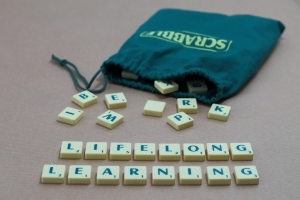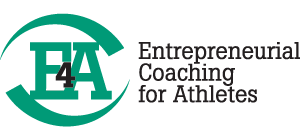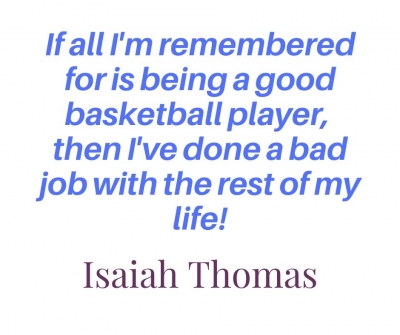What is Professional Development?
According to BusinessDictionary.com, Professional Development is:
Process of improving and increasing [your] capabilities
of staffthrough access to education and training opportunities in the workplace, through outside organization, or through watching others perform the job.[Edits are my own]
Why Invest in Professional Development?
You’re an athlete, right? Why do you need professional development. You have coaches all around you helping you with your game. What more do you need?
Well, here’s the thing – if you’re a professional athlete, you’re so much more than an employee of your team (if it’s a team sport) or a player of your sport. You’re a business owner. As a business owner – you need to concern yourself with a lot more than training and playing your game.
Bottom line – the more you invest in yourself as a business owner, the stronger you will be as a business owner. And the stronger your career will be.
“And that’s all well and good,” you might be thinking, “But I need a real reason to spend my limited time on this professional development stuff!”
Have you ever heard the the concept:
Luck = Preparedness + Opportunity
You have limited power when it comes to Opportunities, right? But what you have ultimate power over is your own preparation. I’m sure you can relate to this – you’ve probably been preparing your whole life to be a professional athlete. So that when you had the opportunity to go pro – you were ready for it!
In my experience, people often don’t even see or credit the opportunities around them, because they aren’t actually ready to take advantage of them. They aren’t prepared.
The essence of business development IS becoming prepared. So that not only do you see the abundant opportunities around you, but you have the confidence to act on them when you see them. And you have the trust in yourself to create new opportunities even when you don’t see them!
You may already have this in spades when it comes to your sport. What I’m talking about includes your sport, and goes far beyond it. It includes your endorsement deals, your appearance deals, your investment deals and everything that goes along with all of that.
The 3 Types of Professional Development
For some careers, continuing education is required to maintain your credentials/licenses. Also called CEUs (Continuing Education Units) or CECs (Continuing Education Credit), these programs generally focus on training directly related to your particular profession – skills that allow you to increase the quality or quantity of your services.
As an athlete – it is possible that your team or national organization offers some professional development that goes beyond your skill as a player. In sport, it’s often referred to as player development or athlete development. And some leagues/teams are more advanced in this area than others.
Some do only the bare minimum that they need to not get sued when something goes wrong or in response to a suit already filed… And there are some teams/leagues that really do place a degree of importance on the advancement of their players. And they will offer some programs on managing your finances and so forth.
But is that enough? I believe that in order to be truly successful both in your business/career and in your life, you need to invest in 3 areas of professional development.
- Professional Skills
- Foundational Life and Business Skills
- Success Skills
Every business owner is best served when they embrace a context of “Always be learning,” and focus on all three areas. (Not necessarily at the same time!)
And remember, I am speaking to you as a business owner, first, an athlete second. This is likely a very different perspective than you’re used to. Because I believe that you as an athlete are only one of the products/offerings of your business. I see you as a fully developed business (or the potential to become one).
Professional Skills
If you’re like most athletes I come across, you spend every day developing your professional skills as an athlete:
- Training to develop your body and protect yourself from injury,
- Learning plays, strategies, techniques
- Practicing those plays, strategies and techniques,
- Watching film to see how others do what you want to be able to do, and so on.
And when you think about professional development, I’m betting this is what you are generally thinking about. And it is important!
Not only do you always want to be developing your personal skill levels. It’s also important in this rapidly changing world to keep up with new developments in your field. Because if you don’t, there will be others, your competition, who do and they will outstrip you! The rules of the game change over time, and you need to keep up!
Unfortunately, this is where most business owners stop in their thinking about ongoing training. Being a successful business owner, whether it’s just you or you have a staff of thousands, requires your facility with skills in several areas that have nothing to do with the product or service you provide (i.e. your play).
Read on to find out what these additional skills might be…
Life and Business Skills
These are the skills that allow you to successfully function in the workplace and in the world. This is a partial list of what might be included in this category.
Life Skills:
- Time Management
- Money Management (Even if you have a business manager and financial planner, you need to know enough yourself to know if they’re doing their job well. And be able to manage your resources so that they last for the rest of your life)
- Task Management (one aspect of time management)
- Organization of your environment
- Communication Skills (including boundary setting and building rapport)
- Leadership
Foundational Business Skills:
- Marketing and Sales
- Business Finances
- Communication, Negotiation and Public Speaking
- Project Management and Planning
- Building and Managing Teams and Delegation
- Networking and Follow-up
- Developing Systems for Your Business Operations
Some of these skills, like time management and organization, are what I consider meta level skills. When your time management, organization and financial management don’t work, nothing else really does either. When coaching a client, I’m constantly amazed at how often clearing up issues around time, space and money have an impact much bigger than either of us expects.
Because they’re meta – and they affect everything.
Success Skills
Success skills are those softer skills that have to do with who you are deep inside and how you engage with your world. This can seem a bit woo woo, I know, and perhaps seem to be more in the “therapy” category.
And yet, as a business coach, I promise you that private clients benefit tremendously in their businesses and in their lives when they commit to expanding their success skills.
The better you function as a human being,
- The better your results will be,
- The happier you will be,
- And the happier the people around you will be (including family as well as staff).
So, what are some of these success skills?
- Focus and emotion management
- Courage and bravery
- Confidence and believing in yourself
- Critical thinking
- Responsibility
- Persistence and resilience
- Self-motivation and momentum
Most of these fall under the larger heading of emotional intelligence. EQ is a complex subject, so I won’t get into it here. But suffice it to say, research has shown that above a certain minimum of IQ, EQ is actually more predictive of success both personally and professionally.
Every day, I see stories about athletes who damage or even ruin their careers because of a lack of EQ. Whether it’s domestic violence, an immature and offensive tweet, or acting out on the field or off the field, emotional intelligence is critically important to your success. So you can avoid these kinds of mistakes that can permanently damage your reputation as well as your earning potential.
 Finally, you can buy a class through a dozen (or more) online sources. You can reach out to your team or league and find out what training is available to you there.
Finally, you can buy a class through a dozen (or more) online sources. You can reach out to your team or league and find out what training is available to you there.
You can take those classes and you’ll probably learn some stuff. In my experience, however, taking a class rarely significantly changes things in the reality of your business. It just doesn’t seem to stick, right?
Why not?
Because if you don’t implement that learning into your business and your life immediately, it will be gone. As the Curve of Forgetting graphically shows, humans don’t retain new information unless it’s put into use within 48 hours!
You’ve seen this in practice, I’m sure – you learn a play – but you don’t really learn it until you run it a few dozen times!
Don’t get me wrong – classes are great! In fact, if you clicked through on any of the links above, you’ll see that most of them are classes that I teach for the ArtistsMBA program. Acquiring new information in areas that you would like to strengthen is important. AND if you don’t have support to implement that information in a regular way, your business will likely not benefit.
For this reason, I recommend coaching, whether privately or in a group setting, to support you in actually taking clear specific action to implement the learning on a consistent basis, and hold you accountable for following through.
It should feel perfectly obvious to you – you work with a coach for your physical training. You work with a skills coach on your skills. You work with a team coach on the overall game. Why wouldn’t you work with a coach on your overall business?
I offer professional development training in 3 formats – the Artists Marketing & Business Academy (online podcast format classes, and not just for artists anymore!), the Marketing & Business Academy Mastery Lab (group coaching) and Private Coaching. Please feel free to reach out if you are looking to expand your skills and increase your success.
This article was inspired by an article I wrote for the Debra Russell Coaching website. You can read the original article here.


